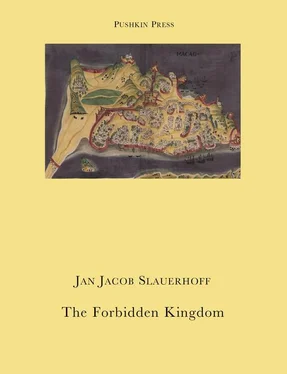“…Keeping all tributes for himself, exploiting the colonies, squandering everything on wars and debauchery, letting his subjects perish on exhausted soil; he gives no chance to men of enterprise. I offered to cede a third of the profits to the state, but I wasn’t allowed to fit out a ship; why should he make do with a third? I tried to argue that twenty times more ships could sail to distant lands than the state could fit out, that it would make it possible to dismiss many thieving officials and that in that way he would be better able to withstand the attacks of the English and the Spanish, which were becoming increasingly shameless, since a free merchant is not a weak protégé but a powerful ally. That was my case, but his ears were under his crown and his sense was in his imperial orb.”
Again a growl of approval. I liked this conversation exceedingly, and climbed out of the boat onto the deck. The two merchants, caught in the act, saw me as a courtier who would denounce them to the King. The one who had been silent made a feeble effort to save the other:
“Forgive him, my Lord. He’s generally a good citizen, but he’s suffered heavy losses and drunk too much tonight.”
I said nothing.
“Forgive him. If you happen to have debts with the Jews…”
I shook my head.
“If you want to run some up, we’ll settle them.”
I wanted to deal carefully with the power I had acquired over these two people; the power I had had over the King for an instant, I had squandered too quickly; it also amazed me that the old man, who at court was governed by drink, his confessor and his sons, could close off whole seas and forbid ship owners to fit out ships; I was also amazed that two men experienced in commerce allowed themselves to be so driven by fear and did not simply deny what I, as an individual, accused them of. When I was young I didn’t yet know the power of the nobility, and when I later came to know it, I had lost my noble status. So I decided to dismiss one and question the other.
“So let him go and rest and sleep off the drink. I’ll deal with him tomorrow.”
The guilty man tried to say something, but his friend pushed him and off he went, forgetting to totter. I asked the other man:
“Why can’t you put to sea? The mouth of the Tagus isn’t barred with chains, is it?”
“We have no crew, my lord.”
“But I’ve often heard the King complaining about the widespread desertion in the army and the fleet.”
The merchant continued to give evasive answers, but when I promised him that I would not bring his name into it, he told me that trade with the overseas possessions, ships, everything, was the property of the King, that his councillors set the prices, and that all ships were searched to make sure those on board were not trading for themselves. It was made almost impossible for ordinary citizens to go into commerce. In Portugal a merchant was on almost the same level as a Moor or a Jew. I listened to him with great satisfaction. The spirit of resistance would grow, and collecting beneath the throne like an explosive gas would hurl it into the air and smash it to pieces.
“If you yourself or your father have influence,” the merchant concluded, “use it for the good of trade and hence of the fatherland.”
I laughed to myself. That was how they all talked, the priests about their church, the officers about the army and the merchants about their trade: as if it were the most sacred thing on earth. I thanked him for his information.
“You friend will come to no harm. The only penance I ask is that tomorrow he knocks the priest over and empties a bucket of water over him.”
The merchant looked at me in dismay and again raised the question of any debts I might have.
“Quite the contrary; that sweaty friar owes me and that’s how I want it settled. A little fresh water won’t do him any harm; he doesn’t see nearly enough of it.”
The next morning those on board were delighted by a totally unexpected occurrence. A good-natured merchant went up to an unsuspecting priest reading his breviary, grabbed a bucket and emptied it over the priest’s head. The cassock clung to his body, and he stood there as a laughing stock for all and sundry.
And in the afternoon the ship reached Abrantes, from where it was another six hours’ ride to the castle. I’d left it two years ago.
Night had almost fallen when I rode into the grounds. The trees and their shadows formed a single black mass, while the swans slept in the pond. Around it stood white silent figures: they were the gods and goddess I used to pelt with stones; I hated them because they represented virtues and commandments. From my earliest youth I had resisted the culture that they tried to teach me and that threatened to permeate me from all sides. I had a presentiment that they would make me ponderous and long-suffering and chain me to the places where it thrives, scattered across the world. Thus my lot, of roaming the earth light and carefree, would be reduced by bitterness to homesickness; after love I feared this power the most. Christianity never had a hold on me; I knew from too early an age the cruelties the Saracens underwent at the hands of these “meek” believers; in this way until I was sixteen I remained a boy who refused to go to church, who laughed in the face of his confessor, threw stones at the altar boys and pulled up flowers in the park. At night I often lowered myself from my window, roamed through the woods and strangled many a startled creature with my bare hands.
One autumn day it rained in torrents. I couldn’t be stuck indoors and took shelter in a summerhouse on the edge of the grounds. There was a book lying in it. I sat there all through that rainy day, but paid no attention to it. Finally I opened it, mocking myself. The poem swept me along and to my surprise I experienced a rapture that lightened the darkness again. I had acquired an Achilles’ heel, one I kept hidden and from which I hoped I would recover, but I went on reading and finally started writing, in utter secrecy, at night; during the day I refused to believe it myself. I had the same hatred for paintings and sculptures, and my father was deeply saddened by my barbaric attitude.
One afternoon, when I was again sitting in the summerhouse reading the Odyssey , I felt his hand on my head; I looked into his face: there was a happy expression on it.
“I’m reading this because it’s about faraway countries, and for no other reason.”
But his face retained the same expression; he took a few sheets out of his pocket and I recognized my own writing. I pushed him away in fury, jumped up and fled. I stayed in the wood all day like a wild cat, swearing I would never write again. However, a week later I started composing after all. I tried to console myself: a sculptor or a painter can’t travel freely; they have to toil away in a studio, but surely I, despite my weakness, could wander at will; a piece of paper, a scrap of tree bark if need be, can be found anywhere, if one can’t help writing. But I knew that this was just sophistry, that anyone afflicted with this malady always yearns for places where one’s fatherland is an intellectual one: Paris, Rome, Ravenna. Without this affliction I would have found my homeland everywhere, both at sea and in the desert, now I would be an exile everywhere, especially in my own country.
This fragment of my youth came into my mind as I rode through the grounds, past the silent statues that were now standing unmolested on their lawns and beneath their foliage.
HIS FATHER WAS SITTING in his armchair in the entrance hall. He got up, not disguising the fact that it was an effort, embraced his son, then held him at arm’s length and praised his appearance in choice terms, but received only a surly reply.
Читать дальше












